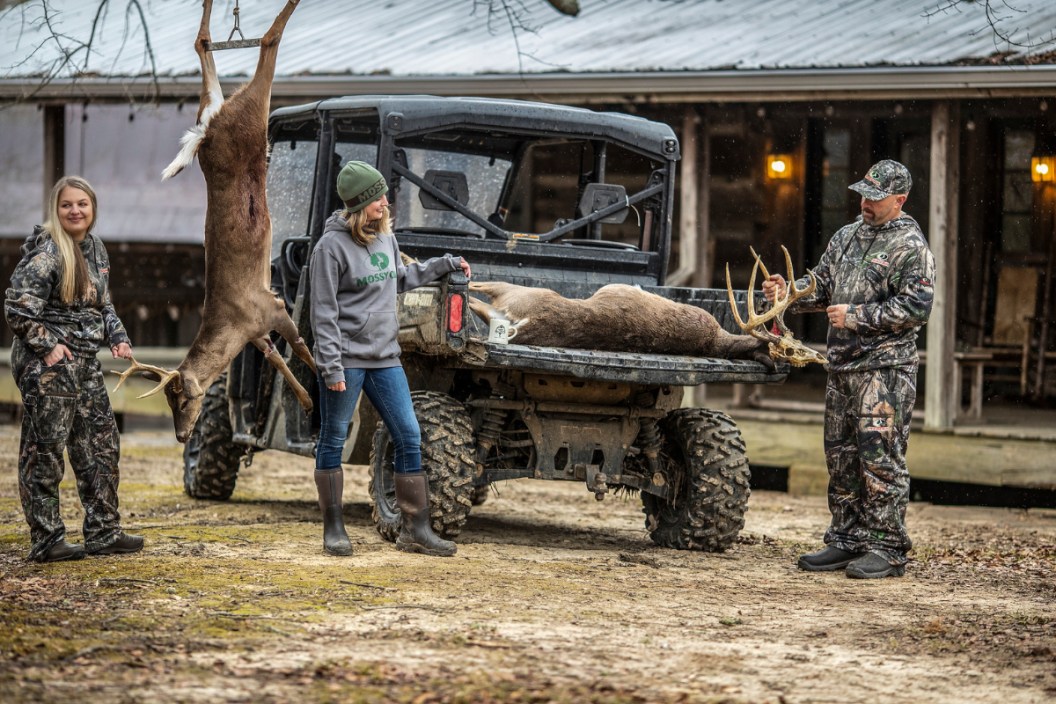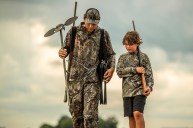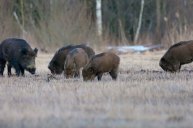Should blue laws affecting hunting be repealed?
Sunday hunting bans still affect hunters in many parts of the country. Slowly but surely however, that seems to be changing with Sunday hunting bills often waiting approval in many states.
But should the day of the week matter when it comes to hunting? Or do they limit hunting opportunities?
We wanted to look at some of these hunting laws here in the United States, and attempt to answer these questions.
What are hunting blue laws?
Blue laws are still in place in many states that were originally instituted for religious reasons. Sunday is often regarded as a day of rest and for church attendance. Such laws may seem in conflict of the separation of church and state, but the U.S. Supreme Court has ruled them to be constitutional many times. Still, legislators have largely been making a push to repeal these laws in many states. They usually cite more hunting license sales and better wildlife management as reasons for removing the laws.
We won't dive into all the reasons for these hunting restrictions. All you really need to know is that blue laws used to affect everything from retail sales to the amount of work one could legally do on Sundays. They are mostly religious laws banning certain activities on the Sabbath. These days, the only time you're likely only to hear about them when it comes to liquor sales and hunting seasons.
Sunday closing laws on hunting vary from state to state. Some states ban hunting on that day of the week completely. Others close off public lands, only allowing hunting on private property. Others, such as New Jersey, restrict the method of take, only allowing bowhunting.
Some states, like South Carolina, have restricted the type of hunting you can do in the past. Deer hunting wasn't allowed on Sundays there for a long time. These days you can hunt on Sundays, but only on private land.
Most states, like North Carolina, have been slowly changing their laws to be more friendly to Sunday hunting. In 2017, the Tar Heel State started allowing hunting on Sunday, albeit with heavy (and admittedly strange) restrictions.
For instance, hunting within 500 yards of a home or place of worship is not allowed. Also, strangely enough, hunting for game birds is not allowed on Sundays. Hunting for deer is fine, you just can't use dogs on Sunday.
This year Delaware is allowing Sunday hunting, but only for deer and only on private lands or select approved public hunting areas. West Virginia has similar rules. Hunters can only pursue game on Sundays on private land with written permission or select federal lands. States like Maryland and Connecticut have also started to allow Sunday hunting, albeit with specific restrictions.
Other states are still holding fast to total bans. Places like Maine, Massachusetts, have bills on the table to repeal the laws, but it has been slow going. As you can see, it's a mixed bag, and we still haven't really made a good enough justification for still having hunting blue laws around.
Perspective from an outsider
Full disclosure, I live and hunt in Michigan. At one time there were a few Sunday hunting closures here, but it was on a county by county basis, and it never affected me personally.
Eventually, the bans were eliminated all together. In fact, it was many, many years before I had even heard of this practice and it completely baffled me the first time I learned of it. You'll find many hunters in Michigan are the same way.
In my state, even the most devoted religious hunters I know aren't opposed to Sunday hunting. It would seem that Sunday hunting bans are very much a cultural thing that varies from region to region.
Out of curiosity, I went looking on social media, and it didn't take me long to find a heated Facebook debate on the topic in Pennsylvania in reaction to the latest news of hunting potentially being opened for three Sundays a year. The comments I read were interesting, to say the least.
There were plenty of hunters who commented Sundays are a day of rest for both humans and animals. It surprised me how many hunters were adamantly against the idea. I've never heard of such a debate here in Michigan. Giving the deer a day of rest? What will that do?
Some were for eliminating the ban and noted that all the gas stations, stores and alcohol sales aren't affected by blue laws as often anymore, making Sunday hunting bans seem all the more antiquated.
Plenty of others chimed in that Sundays were the only safe day to go hiking in Pennsylvania. Again, I've never heard of a single hiker complaint about this during deer season here in Michigan. It all leads me to believe much of the bias against hunting on Sundays is deeply rooted in the traditions of the states where it is practiced. But that's just me.
Let's try looking at some of the advantages and disadvantages of Sunday hunting.
Are there benefits to Sunday hunting bans?
One big argument often used in support of Sunday hunting bans is giving the animals a chance to rest from hunting pressure. In a way, I suppose that makes sense, especially for high-pressure hunting areas. Arguably, too much pressure could negatively affect an animal's ability to survive a particularly harsh winter.
But if it picks back up again on Monday, what good did it really do?
Another argument is the one I mentioned above about hikers and other people who enjoy the outdoors. Should bird watchers or nature photographers be allowed one day a week to get out and enjoy the outdoors in public places without worrying about hunters? I would say so, but I don't know how common it is for a hiker to cross paths with a hunter in places that have Sunday hunting bans.
Some people have argued that Sundays should be reserved for spending time with family outside of the stresses of the work week. It's an interesting argument that does have some merit, as more and more Americans are working longer and longer hours. However, you could also argue that spending time with family in the woods hunting is part of the use of that time.
In Pennsylvania, one leading advocate of Sunday hunting bans is the Pennsylvania Farm Bureau. Their argument has long been that Sunday hunting would lead to increased instances of trespassing and more of a burden on the farmers there.
Just so you do not believe I am completely sour on the idea of bans, I haven't heard anyone make a case for wildlife law enforcement officials. Most agencies (like the Pennsylvania Game Commission) are like most other wildlife agencies around the country, in that they're strapped for resources and manpower as it is. Sunday hunting bans likely make their work easier, if not giving them a day to spend with their families.
Are there disadvantages to Sunday hunting bans?
There are many reasons these bans are going away in much of the United States, but two big reasons are hunter recruitment and money.
Most people work during the week and children spend all week in school. That means the only time some people can hunt is on weekends. And if you can only hunt Saturdays, that severely limits your time in the woods. If you firearm season is only one week, you may only have one day to get it done!
For the time-strapped hunter, or a young, busy student working hard to keep up with his or her studies, it's arguable that Sunday bans do more harm for sportsmen and women than good.
With hunter numbers already in decline, it's not something to be taken lightly. If someone can only hunt one day a week, it just makes it that much easier for them to quit hunting forever.
Another big reason many legislative sessions have moved towards ending Sunday hunting bans is pure economics. In 2014, Virginia did away with their blue law on Sunday hunting. A big thing that swayed lawmakers to change their mind was a report by the National Shooting Sports Foundation that argued the direct impact would be 2,568 jobs and over $50 million in wages just for Virginia alone. The indirect impact was estimated to be another 462 jobs and over $22 million in wages.
Overall, the study estimated that eliminating all bans completely would result in 111,000 jobs and $3.5 billion in wages for the 11 states that at that time, had some form of ban or restriction. That's a huge impact!
I also know there's a lot of crossover; those who are deeply religious are often the same folks who hunt. But there is also an argument to be made for separation of church and state here. By and large, Sunday hunting bans are effectively religious-based laws. It's worth noting I have met hunters who are not religious by any means. Is it fair to them to tell them they can't hunt because of another person's religious beliefs? It's an especially interesting question to pose for non-religious hunters who can't hunt on their own land on Sundays.
One final thought goes back to the idea of giving animals a day of rest. While they do get a break in hunting pressure from humans, game animals like deer, rabbits and squirrels still must worry about natural predators like bears, wolves, coyotes and mountain lions. They don't take a day off.
One could argue this "day of rest" makes no difference to animals. It is not likely most animals realize which days are safe and which ones are not.
The future of Sunday hunting bans
Personally, I feel it is only a matter of time before every blue law affecting hunting is repealed. It will probably start slow before moving statewide in most areas. In many ways, it seems the Sunday hunt ban debate mirrors the arguments I saw here in Michigan over the legalization of crossbows. There were hunters on both sides of the fence. Some were for and others were vocally against them.
In the lead-up to Michigan legalizing crossbows for everyone, some hunters did nothing but complain that it would lead to inexperienced hunters invading the woods during archery season, thus "ruining" things for the more traditional archers. As I noted earlier in the article, I think it had a lot to do with tradition, especially in a state with a rich hunting history like Michigan. There was a small influx of new people out in the woods during bow season, and there are still some hunters complaining about crossbows each season, but for the most part, almost nothing changed.
In fact, I even heard a few hunters admit they were wrong about crossbows and what they believed would happen once they were legalized. If anything, it has led more folks to the deer woods than before, and that's what we need. Crowded hunting areas are less of a worry than we think.
I tend to believe this is probably what would happen in most states that still have Sunday hunting bans if the law was repealed. Look at states like New York, that are rooted in deep hunting tradition. Once they ended their blue laws on Sunday hunting, nothing really changed there either. In fact, many hunters appreciated the extra day to hunt once it was there.
There are good arguments both for and against hunting on Sundays, but in the long run, to me anyway, it makes more sense to eliminate these laws. If only to help more hunters get out in the woods more often. Because in a time when hunter numbers are dropping worldwide, can we really afford to lose more hunters over something as silly as one day a week where they can't hunt?
For more outdoor content from Travis Smola, be sure to follow him on Twitter and check out his Geocaching and Outdoors with Travis YouTube channels.
NEXT: 5 WAYS TO ACTUALLY MAKE A DIFFERENCE IN CONSERVATION THIS HUNTING SEASON
WATCH





